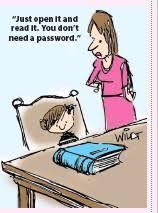In today’s information era, many classrooms around the country focus on interactive instruction that includes computers, movies, PowerPoints, class lecture, and discussion. This seems like a well-rounded learning experience, but it is missing an important component—textbook reading, which builds the foundation for deeper conceptual understanding.
Although the 400-page, 5-pound textbook has become the dinosaur to the lighter versions that can be downloaded on iPads, reading from textbooks holds its relevance. But textbooks have taken a back seat within the education realm and interactive learning has become the frontrunner in education. Has reading comprehension fallen short in curriculum as well?
 Since this sudden thrust of technology has created students with limited attention spans and a need for instant gratification, teachers focus on classroom lecture, class discussion, and technological visuals. Most teachers are fully aware that many students do not like to read or cannot read at grade level. To do their job, to teach, PowerPoint presentations, movies, class lectures, and class discussion take the front seat.
Since this sudden thrust of technology has created students with limited attention spans and a need for instant gratification, teachers focus on classroom lecture, class discussion, and technological visuals. Most teachers are fully aware that many students do not like to read or cannot read at grade level. To do their job, to teach, PowerPoint presentations, movies, class lectures, and class discussion take the front seat.
Today’s interactive learning environment has both good and bad points. The positive is that students are learning, but mostly peripherally. They know the basics, but they do not have the depth of understanding for foundations that can build upon higher-level learning.
Image Source: https://www.pressreader.com/usa/womans-world/20170605/281758449221552
The result of this technological era is a declining reading culture—along with diminishing vocabulary knowledge and receding standardized test scores. That is why some students who take standardized tests, such as the ACT or SAT have disappointing scores—even after completing local and national preparation programs. ACT and SAT tutors have become the new norm for families that can afford this. And when students get to college, most are overwhelmed with the deluge of reading material that was not a high school requirement.
In many high school classrooms, including many AP classes, textbooks are not used. Parents of AP students have been told by teachers that, “We don’t use textbooks because students are unable to comprehend them.” Folks, students are getting college credit for teachers that teach to the test?
As a parent and educator, I know that my youngest child, now 25 used textbooks. So, sometime after 2011, education took a turn into this dark rabbit hole. I firmly believe that this lack of reading comprehension acumen is the culprit for our regressed standardized test scores.
What are your thoughts? Please reach out to me at: Cindy@RTSssuccess.com
Since most adults know that reading is the foundation for in-depth learning, RTS Success® has been busier than ever. We now have highly skilled, certified RTS Success® coaches who can help motivated students to attain top scores with minimal effort! We stand behind our claim to be the best insurance policy for overall academic success!
Visit www.RTSsuccess.com and check us out. The Getting Started Page starts the application process!

